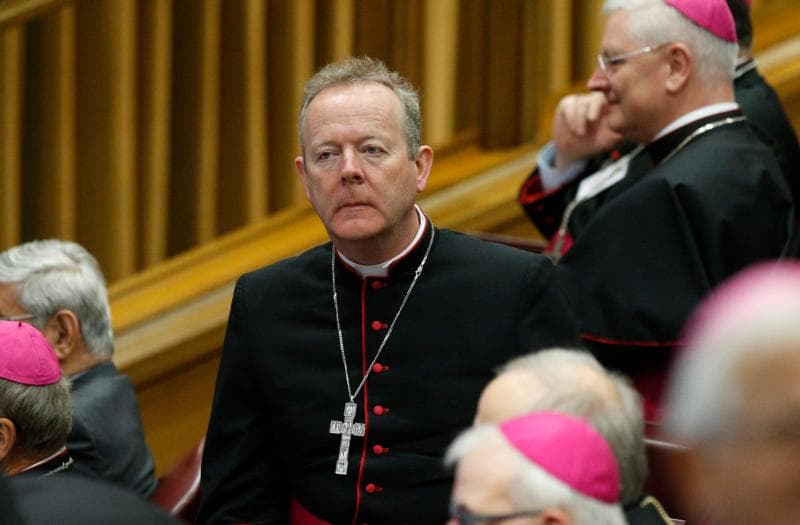LEICESTER, United Kingdom – Britain and Ireland are going through “a period of dangerous political, social, and economic uncertainty,” according to the president of the Irish Catholic Bishops’ Conference.
Archbishop Eamon Martin of Armagh pointed to the lack of a sitting Northern Irish Assembly, an increase in sectarianism over the summer, and the Brexit crisis as the main drivers of this uncertainty.
UK Prime Minister Boris Johnson is trying to keep a “no deal” Brexit on the table, despite opposition from Parliament. This could lead to the re-imposition of border checks between Northern Ireland and the Republic of Ireland, which would undermine the 1998 Good Friday Agreement that ended the 30-year “Troubles” on the island.
Martin was giving the Edward M. Kennedy lecture on the role of faith in politics at the Kennedy Summer School in Wexford on Sept. 5.
In his speech, the archbishop said bringing faith to politics is “not an optional extra for a committed Christian.”
“Our faith makes us want to cry out at the extent of homelessness, poverty, addictions and violence, criminality and corruption on the streets of Ireland. It moves us to weep that so many of our young people resort to self-harm and taking their own lives,” he said. “We cannot ignore the plight of the refugee and those who are hungry, persecuted, trafficked and exploited in our world. We rightly feel ashamed and repulsed by the horrific revelations of child abuse and other shameful episodes where the reputation of the Church was put before the compassionate call of the Gospel to protect the vulnerable and reach out to the marginalized.”
Revelations about clerical sexual abuse has left public confidence in the Church at its lowest level in the history of Ireland, leading to growing secularization in what was once the most Catholic nation in Europe. In 2015, the Republic of Ireland held a referendum on same-sex marriage in which 62 percent of the voters backed changing the constitution to allow the practice.
In May 2018, over 66 percent of the electorate voted to remove protections for the unborn from the constitution; and earlier this year, voters overwhelmingly chose to remove the four-year waiting period for a divorce.
Currently, just over 78 percent of the population describes itself as Catholic, a sharp decline from the 84 percent who said they were Catholic in 2011. Of that number, less than 30 percent attend Mass every week; it was over 87 percent just 20 years ago.
The numbers are even more striking when looking at young adults: The European Social Survey released last year shows only 54 percent of people between the ages of 16 and 29 identify as Catholic, and less than 25 percent claim to attend Mass weekly.
In his lecture, Martin warned against an “aggressive secularism” that relegates faith to the privacy of homes and places of worship.
“At worst it tends towards intolerance and insists that in a democratic republic the default position should be no societal acknowledgment of God. It sees the moral convictions of Christians in public life as automatically suspect – perhaps even illegitimate because they are advanced by believers,” the archbishop said.
Instead, he promoted a “healthy secularity” that admits a distinction between Church and State, “but allows the space for Christians to intervene in public debate and to make their arguments as brothers, sisters and friends alongside those of all faiths and none.”
At the same time, Martin warned against the “danger” of living parallel lives in the spiritual and secular worlds.
“Catholic politicians, in particular, have an important, but very challenging, responsibility nowadays to support laws which uphold the dignity of every human person made in God’s image – even when this is not the popular opinion to hold,” the archbishop said, “I would say to them: Laws and policies that fundamentally contradict the moral law, such as those that would violate the life and integrity of any person at any stage, from conception to death, are fundamentally unjust and must be opposed, not only on the grounds of faith, but also by virtue of right reason.”
Martin said the “marginalization” of faith communities from public life in Ireland – “where the Christian faith is so deeply embedded in our culture, language, landscape and identity” – would not bode well for the country.
He warned against forcing people to remove all their religious and cultural symbols from public spaces, or making them retreat from public discourse altogether.
At the same time, he said he welcomed Irish Prime Minister Leo Varadkar’s call for building a new relationship between church and state.
“The Church and the political community, whilst autonomous and independent of each other, would do well in these troubled times to dialogue and cooperate in the service of Ireland and the protection of humanity,” Martin explained.
In recent weeks people have spoken to me of politics descending into a dangerous factionalism and of a weakening of confidence in the integrity of parliamentary democracy. It is vitally important that church, civic society and government work together to preserve the fundamental concern for the common good,” he continued.
“In an Ireland where rising individualism is often accompanied by growing disaffection and disillusionment with the leadership provided by both church leaders and public representatives – faith and politics need each other.”
Crux is dedicated to smart, wired and independent reporting on the Vatican and worldwide Catholic Church. That kind of reporting doesn’t come cheap, and we need your support. You can help Crux by giving a small amount monthly, or with a onetime gift. Please remember, Crux is a for-profit organization, so contributions are not tax-deductible.















